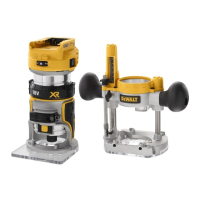44
ENGLISH
Cutting with the Fixed Base (Fig. C)
Set up the router to use the fixed base by following the
instructions in the Assembly and Adjustmentssection.
After the router is set-up, install the battery pack as shown
in Fig.C, then set your router speed (refer to Choosing
RouterSpeed).
NOTE: Always feed the router opposite to the direction in which
the cutter isrotating.
Cutting with the Plunge Base, DCW604 Only
(Fig. A)
NOTE: The depth of cut is locked in the plunge base's default
state. The plunge lock requires user actuation to enable the
"release to lock" plungemechanism.
1. Depress the plunge lock lever
16
and plunge the router
down until the bit reaches the setdepth.
2. Release the plunge lock lever
16
when desired depth
isreached.
NOTE: Releasing the plunge lock lever automatically locks
the motor inplace.
NOTE: If additional resistance is needed, use the hand to
depress the plunge locklever.
NOTE: If additional clamping strength is required, press the
lock lever further to tighten in the clockwisedirection.
3. Perform thecut.
4. Depressing the plunge lock lever will disable the locking
mechanism allowing the router bit to disengage from
theworkpiece.
5. Turn the routeroff.
Direction of Feed (Fig. O)
The direction of feed is very important when routing and can
make the difference between a successful job and a ruined
project. The figures show the proper direction of feed for some
typical cuts. A general rule to follow is to move the router in
a anticlockwise direction on an outside cut and a clockwise
direction on an insidecut.
Shape the outside edge of a piece of stock by following
these steps:
1. Shape the end grain, left toright.
2. Shape the straight grain side moving left toright.
3. Cut the other end grainside.
4. Finish the remaining straight grainedge.
Choosing Router Speed (Fig. A)
Refer to the Speed Selection Chart to choose a router speed.
Turn the variable speed dial
4
to control routerspeed.
Soft Start Feature
The compact routers are equipped with electronics to provide
a soft start feature that minimizes the start up torque of
themotor.
MAINTENANCE
Your power tool has been designed to operate over a long
period of time with a minimum of maintenance. Continuous
satisfactory operation depends upon proper tool care and
regularcleaning.
WARNING: To reduce the risk of serious personal
injury, turn tool off and disconnect battery pack
before making any adjustments or removing/
installing attachments or accessories. An accidental
start-up can cause injury.
The charger and battery pack are notserviceable.
Lubrication
Your power tool requires no additionallubrication.
Variable Speed Control (Fig.A)
This router is equipped with a variable speed dial
4
with 7
speeds between 16000 and 25500 RPM. Adjust the speed by
turning the variable speed dial
4
.
NOTICE: In low and medium speed operation, the speed
control prevents the motor speed from decreasing. If you
expect to hear a speed change and continue to load the
motor, you could damage the motor by overheating.
Reduce the depth of cut and/or slow the feed rate to
prevent tooldamage.
The compact routers are equipped with electronics to monitor
and maintain the speed of the tool whilecutting.
SPEED SELECTION CHART*
DIAL SETTING APPROX. RPM APPLICATION
1 16000
Large diameter bits and cutters2 17500
3 19100
4 20700
Small diameter bits and cutters.
Softwoods, plastics, laminates.
5 22300
6 23900
7 25500
*The speeds in this chart are approximate and are for reference only. Your
router may not exactly produce the speed listed for the dial setting.
NOTE: Make several light passes instead of one heavy pass for
better qualitywork.
Worklights (Fig. A)
The worklights
10
are located at the front of the motor
6
. To
turn on the worklight, switch on the on/off switch
3
. Worklights
will remain on 20 seconds after the on/off switch is moved to
the off position.
NOTE: The worklights are for lighting the immediate work
surface and are not intended to be used as aflashlight.
NOTE: If worklights flash, check the charge on the battery; it
could be low. If they still flash with a charged battery, the unit
should be taken to a service centre forevaluation.

